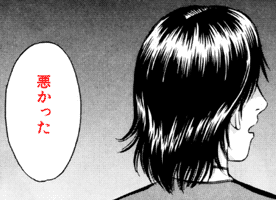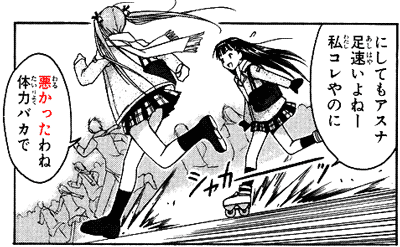Manga: Holy Land, ホーリーランド (Chapter 39, 同族~One's Clan~)
Examples
When warukatta shows up alone, it pretty much always means "sorry for that." It's an informal way of apologizing, like suman すまん and gomen ごめん.Technically, warukatta isn't an actual apology, an admission of fault: "what I did was bad," i.e. "my bad." That implies you're sorry for it.
Manga: Holy Land, ホーリーランド (Chapter 39, 同族~One's Clan~)
- Context: this guy is sorry for something he did.
- warukatta
悪かった
Sorry for that.
The only difference between warukatta and warui used in apologizing is that, since warukatta is in the past, it implies you're sorry for something you did or have done in the past, whereas the word warui tends to be used for something you did very recently, like moments ago.
If the adjective is say someone "was bad," it means it's blaming them for something they did.
- kare ga warukatta
彼が悪かった
He was bad.
It was his fault.
When the adjective says something that was done "was bad," it means the speaker is admitting that was a mistake.
- are wa warukatta
あれは悪かった
That was bad.
I'm sorry for that. I shouldn't have done that. That was a mistake.
Manga: Mahou Sensei Negima! 魔法先生ネギま! (Chapter 1, お子ちゃま先生は魔法使い!)
- Context: a tsundere and her friend run to school.
- ni shitemo Asuna
にしてもアスナ
[That said,] Asuna, - ashi hayai yo nee
足速いよねー- [Your] legs are fast. (literally.)
- You [run] fast.
- watashi kore ya no ni
私コレやのに
Even though [for] me, [I] have this.- This = roller-skates. She's running at the same speed the other is rollerskating.
- warukatta wa ne
悪かったわね
[Well, I'm sorry]- This is sarcasm.
- tairyoku baka de
体力バカで
For being a physical-strength baka.- i.e. for having so much stamina, endurance, agility, strength, etc.
Set phrases and compound words that contain the word warui 悪い are sometimes inflected to past by replacing it with warukatta. For example:
- kimochi warui 気持ち悪い
"Feeling bad."
[It] is gross. - kimochi warukatta
気持ち悪かった
"Feeling was bad."
[It] was gross.
- un ga warui 運が悪い
"Luck is bad."
Bad luck. Unlucky. - un ga warukatta
運が悪かった
"Luck was bad."
You were unlucky. (that's why bad stuff happened to you!)
- naka ga warui 仲が悪い
"Relationship is bad."
[They're] not in good terms. - naka ga warukatta
仲が悪かった
"Relationship was bad."
[They] were not in good terms. (but now they're friends again.)
Lastly, warukatta can also just mean "was bad" normally, as you would expect, since it's the past form of warui.
- tenki ga warui
天気が悪い
The weather is bad. - tenki ga warukatta
天気が悪かった
The weather was bad.


No comments: